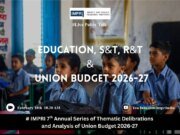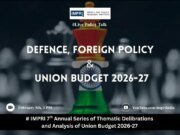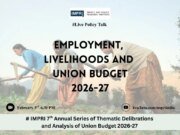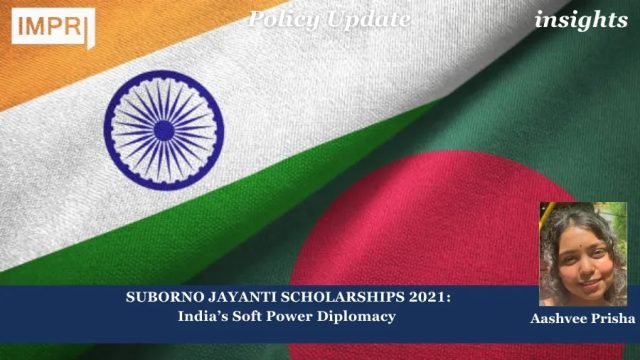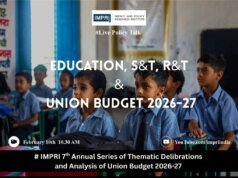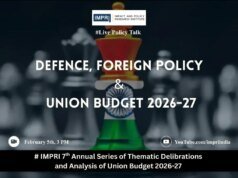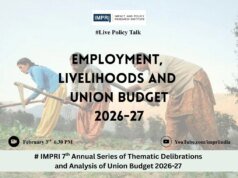Policy Update
Aashvee Prisha
Background
The Suborno Jayanti Scholarship was announced during the PM visit to Bangladesh on 26-27 March 2021, to promote synergies between the two nations on Bangladesh’s 50th Anniversary (Suborno Jayanti). This initiative exemplifies India’s educational and capacity building diplomacy: with allocation of 1000 scholarships, divided evenly between 500 academic scholarships managed by Indian Council for Cultural Relations (ICCR) and 500 professional training seats under the Indian Technical and Economic Cooperation (ITEC) programme, which is overseen by Ministry Of External Affairs (MEA). 1
Under the Suborno Jayanti Scholarship, the ICCR consolidates its bilateral scholarships for Bangladeshi Students, into one streamlined mechanism with 500 slots for academic year 2024-25. A dedicated portal (sjsdhaka.gov.in) was launched in February 2022 to facilitate the application process and to make admission coordination easy between the two nations.2 This initiative is an example of India’s soft power diplomacy, combining education with regional diplomacy. The scholarships aim to “attract the best and brightest talents” and foster educational and cultural synergies between the two countries in line with India’s New Education Policy.2
source: pib.gov
Functioning
Eligibility Criteria: Applicants are to be at 18 years of age at the time of applying to the universities, not more than 40 years of age for UG/ PG courses, and not more than 50 years for PhD. There is no upper age limit for courses like Hindi/ Sanskrit/Indian performing arts. UG applicants must have completed 12 years of formal schooling. For science, engineering, or biology courses, must have an appropriate academic background. The mandatory medium of instruction for all the courses is English, and applicants must have adequate English proficiency, for which applicants may submit TOEFL/IELTS scores, or otherwise be evaluated via a portal-based essays.3
Application Process: Applicants from Bangladesh register first on the Suborno Jayanti Portal, followed by the ICCR portal. Applicants have the option to apply upto 5 Indian universities or institutes, in the order of their preference of study. Students must be prepared to receive admission from any of their 5 preferences, due to the limited number of seats. English proficiency is a prerequisite, following which universities review and decide on acceptances. ICCR HQ is consulted if seats are oversubscribed. “ GEE Bangladesh” is not an authorised agent for ICCR and therefore engagement with such entities may result in applications cancellation and blacklisting.4
Scholarships: SJS scholarships are fully funded and are available for selected students, as per ICCR guidelines. ICCR scholars receive full tuition coverage at their Indian university, plus living allowances and other benefits. Tuition and compulsory fees are paid by ICCR directly, only hostel deposits or mess charges (if any) are to be borne by students.5
Administration: The program is jointly managed by India’s Ministry of External Affairs. ICCR administers the 500 academic scholarships, while the MEA’s ITEC division handles the 500 professional slots. The Indian High Commission in Dhaka liaises with Bangladeshi authorities, for publicity, candidate screening, and counselling. Oversight is managed by MEA channels and administration remains highly centralized.
Performance
Following the initiative’s launch, 267 Bangladeshi students benefited from ICCR academic scholarships under the Suborno Jayanti scholarship. Simultaneously, 285 professionals participated through e-ITEC programmes— showing a strong start despite COVID-19. As of Academic-Year 2022-23, the programme was upscaled with 500 scholarship slots filled exclusively under ICCR students. For the Academic-year 2023-24/2024-25, around 550 Bangladeshi students were selected for fully-funded ICCR scholarships, who are now enrolled in institutions like IITs, NITs, DU, Rabindra Bharati University, Visva-Bharti, and Calcutta University.
Scholarship numbers grew from 267 (AY 21-22) to approximately 550 (AY 24-25), indicating a positive upward trend and growing demand. Placements across elite technical, humanities and arts institutions show diversification and broad academic outreach. Financial support to the students have also been strengthened since the launch of the scholarship.6
While award figures are clear, a continuous challenge that is seen is data opacity, official reports don’t reveal basic breakdown by gender, religion, or socio-economic status. Apart from aggregate total and annual seat availability, there are no data which is publicly available on the total applications received, selection rates, or alumni outcomes. Therefore, there is a serious lack of transparency, and the absence of demographic data has been noticed by civil society analysts as a gap in monitoring the programme’s equity and effectiveness.
Impact
Since launch, through Suborno Jayanti Scholarships, AYUSH and ITEC programs, India’s ICCR and ITEC schemes have collectively channelled Human Resource development support to over 10,000 Bangladeshi nationals. It has already begun delivering soft power dividends in people to people goodwill. By educating hundreds of future Bangladeshi leaders in India, it reinforces long-term ties. Many alumni now serve as informal ambassadors of India-Bangladesh friendship. For instance, a Times of India report quotes a student from Bangladesh, Sheroshi Shreya, who expressed her heartfelt thanks, after receiving her Rs. 18000 ICCR stipend.
Beyond individual stories, SJS helps build human capital in Bangladesh by enabling many Bangladeshi professionals to upgrade their skills in various areas through ITEC channels. The cultural aspect also plays a key role— students engage in India’s vibrant academic environment, often remaining active in ICCR alumni associations. Overall, by enabling young Bangladeshi students to study together with Indian students in flagship institutes, the scholarship fosters a cadre of India-friendly professionals- whose long-term networks deepens Indo-Bangladesh people-to-people relations.
Emerging Issues
- Data Transparency: There is no publicly available information on the number of total applicants vs selected candidates, making it difficult to assess the programme’s competitiveness or outreach efficiency. Performance reports and announcements do not include data on gender, regional or income background of recipients, limiting any analysis of social equality or inclusivity. The absence of structured academic tracker, alumni network, or career mapping means that policymakers have little insight into whether students complete their programme or contribute to India-Bangladesh cooperation after graduation.
- Centralised Administration: The program is driven by the Indian High Commission and ICCR in Dhaka, with limited local input, which means there is no involvement of Bangladesh’s Ministry of Education in decision-making which could otherwise help align SJS with Bangladesh development priorities.
- Limited Credit Flexibility: Currently, the scholarship scheme functions as a one-way opportunity. There is no framework for credit transfers, joint degrees, or mutual academic recognition between Indian and Bangladeshi institutions. Expanding academic mobility under broader SAARC or ASEAN frameworks could address this gap.
Way Forward
To strengthen and sustain the SJS, the digital application process should be updated with user-friendly tools such as simple online forms, real time status updates basic language tutorials on India’s SWAYAM platform.
Building a dedicated alumni network will help past scholars stay connected, share success stories and help future applicants. Expanding the scheme gradually to other South Asian neighbours can foster wider regional cooperation. At the same time, transparent reporting of yearly application and award numbers along with basic demographic data will allow both governments to track equity and reach.
Finally, introducing flexible credit-transfer agreements between Indian and Bangladeshi universities will give students more options and deepen academic ties. Together, these steps will make the scholarships more inclusive, accountable, and beneficial for a better future.
References
About the Contributor
Aashvee Prisha is a Research Intern at IMPRI. She is currently pursuing her undergraduate degree in Political Science, with a deep interest in international relations, gender diplomacy, and digital storytelling.
Acknowledgement
The author sincerely thanks Ms. Aasthaba Jadeja for her invaluable mentorship and guidance during the development of this article. Special thanks are also extended to her fellow IMPRI interns for their thoughtful inputs, support, and camaraderie throughout the process.
Disclaimer: All views expressed in the article belong solely to the author and not necessarily to the organization.
Read more at IMPRI:
International Training Centre for Operational Oceanography (ITCO-ocean)


